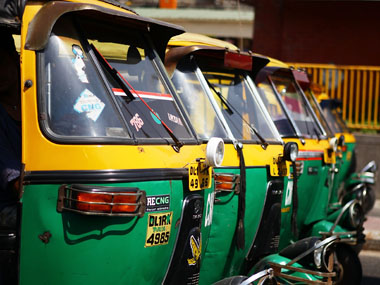Two weeks ago, I had a meeting with Roopak Saluja from Bang Bang Films. As those of you in advertising and media would know, Bang Bang has been one of the fastest growing production houses in India. Last year, they added a digital unit, Jack-in-the-box,to the organisation. And they ran out of space and began hunting for a second office space. They finally managed one, barely 100 metres from where the first is. “I wanted to ensure that one could walk from office to office and not depend on auto-rickshaws, " was Saluja’s reasoning. If Bang Bang was in Chennai, he’d have a nightmare. [caption id=“attachment_18681” align=“alignleft” width=“380” caption=“If there’s one indicator of the collapse of law and order and the politicisation of the police force, it’s when the taxis and auto rickshaw operators take the law into their own hands, as they do in Chennai. Matt King/Getty Images”]
 [/caption] You can’t get a rickshaw in Chennai to put down the meter. Not one. So the minimum fare is defined by the mood of the rickshaw driver— I haven’t paid less than Rs.30 in the past year (which is when the driver was in a good mood). Which is okay for me, as I visit Chennai for a couple of days each year. But it’s not okay for my mother, who’s 72 and lives in Chennai. You can complain to the police, but the police take no action. You can (if you have a death wish) insist that the driver takes you to the nearest police station. He won’t; he’ll bodily throw you out of the vehicle, aided and abetted by other drivers, with a hapless public looking on. It’s not okay for the many millions who do not own their own transport and need to travel short distances. If there’s one indicator of the collapse of law and order and the politicisation of the police force, it’s when the taxi and auto rickshaw operators take the law into their own hands, as they do in Chennai. Commuting is a necessity— in some ways it’s the life-blood of industry, of commerce. And for others, it’s needed for recreation, to catch up with friends and relatives, and so on. In Chennai, today, commuting is expensive— to a point where people travel only when it’s absolutely necessarily. No trip to Elliot’s beach; it’s too expensive. No trip to the Marina; it’s too expensive; no trip to see an aging aunt; it’s too expensive. Is a visit to the doctor really necessary when getting there is so expensive? Thankfully, in most parts of India (especially in the metros, where it matters most), rickshaws and taxis are within reach of the middle class. In Chennai, it’s a nightmare, where someone comfortable financially, as my mother, thinks twice before taking a rickshaw. Can you get my mother a rickshaw, Ms Jayalalithaa? One that respects the law?
[/caption] You can’t get a rickshaw in Chennai to put down the meter. Not one. So the minimum fare is defined by the mood of the rickshaw driver— I haven’t paid less than Rs.30 in the past year (which is when the driver was in a good mood). Which is okay for me, as I visit Chennai for a couple of days each year. But it’s not okay for my mother, who’s 72 and lives in Chennai. You can complain to the police, but the police take no action. You can (if you have a death wish) insist that the driver takes you to the nearest police station. He won’t; he’ll bodily throw you out of the vehicle, aided and abetted by other drivers, with a hapless public looking on. It’s not okay for the many millions who do not own their own transport and need to travel short distances. If there’s one indicator of the collapse of law and order and the politicisation of the police force, it’s when the taxi and auto rickshaw operators take the law into their own hands, as they do in Chennai. Commuting is a necessity— in some ways it’s the life-blood of industry, of commerce. And for others, it’s needed for recreation, to catch up with friends and relatives, and so on. In Chennai, today, commuting is expensive— to a point where people travel only when it’s absolutely necessarily. No trip to Elliot’s beach; it’s too expensive. No trip to the Marina; it’s too expensive; no trip to see an aging aunt; it’s too expensive. Is a visit to the doctor really necessary when getting there is so expensive? Thankfully, in most parts of India (especially in the metros, where it matters most), rickshaws and taxis are within reach of the middle class. In Chennai, it’s a nightmare, where someone comfortable financially, as my mother, thinks twice before taking a rickshaw. Can you get my mother a rickshaw, Ms Jayalalithaa? One that respects the law?
Anant Rangaswami was, until recently, the editor of Campaign India magazine, of which Anant was also the founding editor. Campaign India is now arguably India's most respected publication in the advertising and media space. Anant has over 20 years experience in media and advertising. He began in Madras, for STAR TV, moving on as Regional Manager, South for Sony’s SET and finally as Chief Manager at BCCL’s Times Television and Times FM. He then moved to advertising, rising to the post of Associate Vice President at TBWA India. Anant then made the leap into journalism, taking over as editor of what is now Campaign India's competitive publication, Impact. Anant teaches regularly and is a prolific blogger and author of Watching from the sidelines.
)